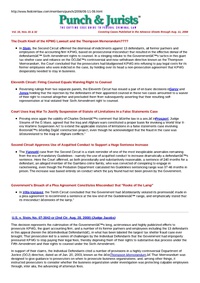While the Apprendi/Booker/Gall line of cases has unquestionably done much to eliminate some of the irrationality from the rigid sentencing scheme that existed during the mandatory era of the Guidelines, there still remain inexplicable vestiges of a sentencing scheme that defy logic, common sense and, especially, basic fairness. The …
Here the Court affirmed the dismissal of indictments against 13 defendants, all former employees of KPMG, based on prosecutorial misconduct that resulted in the effective denial of the defendants’ Sixth Amendment rights to counsel.
This decision represents the culmination of the Government’s long, acrimonious and highly publicized efforts …
Defendant's conviction for drug- and gun-related offenses is affirmed over claims of error regarding the sufficiency of the evidence to support his conviction, which alleged the government failed to prove that he held drugs with a commercial purpose. However, the sentence is remanded to give the district court an …
[Editor's Note: For a more detailed commentary on this decision, see "Second Circuit Issues Notable Decision Distilling Recent Developments in Sentencing Jurisprudence and Clearly Reaffirming Centrality of Sentencing Court’s Discretion," as posted on New York Federal Criminal Practice on June 28, 2008, at http://www.nyfederalcriminalpractice.com/2008/06/second-circuit-issues-notable-5.html, as follows:
"In a lengthy …
Jesus Villa-Vazquez was indicted on one count of illegal reentry after a prior deportation for an aggravated felony. He entered into a plea agreement that required the government, among other things, to refrain from bringing further charges and to recommend both a sentence reduction for acceptance of responsibility and …
[Editor's Note: For a commentary about this decision, see "Lethal Rejection," by Steve Statsinger, as posted on the Second Circuit Blog on July 13, 2008 at http://circuit2.blogspot.com/2008/07/lethal-rejection.html as follows:
"Donald Fell was not having a good day. During a card game, he killed his mother’s boyfriend, while his buddy, …
U.S. v. Garey, 540 F.3d 1253 (11th Cir. Aug. 20, 2008) (En banc) (Judge Black)
Jones v. Walker,540 F.3d 1277 (11th Cir. Aug. 20, 2008) (En banc) (Judge Black)
In these two separate en banc decisions, the Eleventh Circuit unanimously ruled that a rejection by criminal defendants of their …
Here the Court held that the Iraq war constituted a proper basis for invoking a World War II-era Wartime Suspension Act to extend the applicable statutes of limitations in a false statements case that was unrelated to the war.
In this case, Judge Stearns ruled that Federal prosecutors …
For a commentary on this decision, see "Judge Bright gives shout out to Second Chance Act," by Prof. Doug Berman, as posted on Sentencing Law and Policy on August 27, 2008 at http://sentencing.typepad.com/sentencing_law_and_policy/2008/08/judge-bright-gi.html as follows:
"Concurring today in US v. Wessels, No. 07-3208 (8th Cir. Aug. 27, 2008) (available …
Here the en banc Court held that a rejection by a criminal defendant of his appointed counsel can constitute a waiver of the right to counsel altogether and can prevent a subsequent claim that, by acting pro se, the defendant's rights were violated.
U.S. v. Garey, 540 F.3d …
On remand from the Supreme Court at 128 S.Ct. 1060 in light of Kimbrough v. U.S., the Eighth Circuit reversed its previous ruling reported at 439 F.3d 826 (8th Cir. Mar. 3, 2006), and held that the sentencing judge had erred by finding it lacked authority to vary its …
This Protective order was issued in connection with the Court's decision also reported at 501 F.3d 179 (D.C.Cir. July 20, 2007) and then amended on Oct. 23, 2007. Both the July 20 ruling and the amended Protective Order were subsequently vacated by the Supreme Court on June 23, 2008, …
